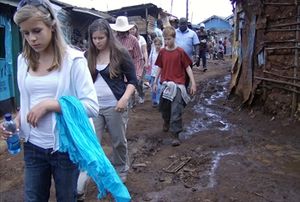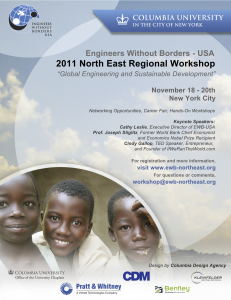EWB 501-New Programs
At Boston University, we’ve been busily working on getting our program approved in Zambia, and were fortunate enough to overcome a setback when the EWB Assessment Review Committee (ARC) initially rejected our 501-New Program Application. This is not unusual, according to a contact in the EWB-Boston Professional Chapter. However, it was more than difficult to see months of hard work rejected.
Thankfully, we were able to talk to Dave Sacco, an ARC and TAC (Technical Advisory Committee) reviewer. He offered some great insight into how to successfully appeal and apply for our Program in Zambia. Thanks to Dave’s help, we were approved to open our program! Here are some of the things we learned from his short seminar:
A program is a chapter’s overarching commitment to collaboration between the chapter and community for the minimum 5 years required by EWB-USA. In comparison, a project is a small piece within a program. Projects are implemented to address the needs identified by the community.
While the distinction between these two things is relatively fine, it’s important to recognize their unique identity. There may be many projects you could implement that pertain to the program’s theme. In our case, we’re looking to focus on community health. As a part of this program, we could implement a water filtration project, a sanitation project, or the cell phone amplification project we’ve been looking at. Allowing for this type of flexibility allows EWB chapters to approach the needs of the community holistically.
When filling out your initial New Program application, you shouldn’t have all the answers or solutions. This is a red flag for ARC reviewers that you have too many preconceptions as you enter into this program.
While it can be difficult to respond to the questions the 501 may ask because it seems to want explicit answers or details, Mr. Sacco stated that ambiguity should be expected during these first steps. You haven’t, in theory, been on the ground and met your community face-to-face, yet. If anything, you may have some prospective leads on projects, but these projects cannot be successfully implemented or approved until you have gathered primary evidence and data about what the community needs and the best way to sustainably implement a solution.
In our past program in Peru, we experienced a great example of this. The community, during initial contact, discussed a desire for electricity. Based on the information our chapter had received, it seemed like solar panels would fit their needs. However, on the assessment trip, it became clear that while they could benefit from electricity, they were dying from contaminated water. From this, a new plan of action was charted to find a way to purify their water sources. Only once we had been on-site were we able to obtain a complete picture of what our community was dealing with and how to prioritize potential projects.
Make sure your community and partnering NGO are clear on who owns the projects and who ought to be the primary beneficiaries.
Although it may seem obvious, Dave Sacco reminded the seminar attendees to be clear during your discussion with partner NGOs, the government, and community leaders that your purpose as an EWB chapter is to collaboratively implement projects that address the needs the community faces. This means that the primary motivation for your work is always the community–not the NGO, not the government–the community. If this is not obvious in from your New Program application, it will not be approved by EWB.
Now that the New Year has just begun, EWB-USA will be implementing a new system to open New Programs. Now, the community or partner NGO must submit the 501 and the EWB chapter must adopt it by filling out a different form, the 502. By doing this, EWB-USA hopes to engage communities and NGOs that are invested in collaboration and actively seeking solutions. According to Dave Sacco, it seemed that EWB chapters have struggled in the past to successfully screen communities that would successfully work with the chapter. By changing the New Program application structure, hopefully, more chapters will enjoy successful and fulfilling programs with partnering communities.
 Poverty tourism. It's one of the biggest concerns we have as an organization. Cathy Leslie, the EWB-USA Director, specifically addressed it in her Annual update, and we felt it was fitting to kick off the series on the topic. So, what exactly does this term mean? It has a few layers but in a quick sentence, it's when people visit impoverished communities and, usually, drop off 'solutions, snap some photos with locals, and leave..never to be heard from again.
Poverty tourism. It's one of the biggest concerns we have as an organization. Cathy Leslie, the EWB-USA Director, specifically addressed it in her Annual update, and we felt it was fitting to kick off the series on the topic. So, what exactly does this term mean? It has a few layers but in a quick sentence, it's when people visit impoverished communities and, usually, drop off 'solutions, snap some photos with locals, and leave..never to be heard from again. EWB-Boston University has successfully returned from a jam-packed weekend of workshops, speakers, and subway rides in the Upper West Side. The 2011 Northeast Regional Conference was hosted by the Columbia University chapter, and they did a great job of lining up speakers, organizing the attendees, and facilitating the event's success. In particular, the conference heralded speakers like the Executive Director of EWB-USA and a Nobel Peace Prize laureate. There were workshops spanning member and leader training, cell phone application in Sub-Saharan Africa, fundraising, and the EWB program application process. Just like the Millennium Campus Conference, we'll be posting a series of articles featuring some of the key takeaways we identified for our chapter and the lessons shared by the speakers. So stay tuned!
EWB-Boston University has successfully returned from a jam-packed weekend of workshops, speakers, and subway rides in the Upper West Side. The 2011 Northeast Regional Conference was hosted by the Columbia University chapter, and they did a great job of lining up speakers, organizing the attendees, and facilitating the event's success. In particular, the conference heralded speakers like the Executive Director of EWB-USA and a Nobel Peace Prize laureate. There were workshops spanning member and leader training, cell phone application in Sub-Saharan Africa, fundraising, and the EWB program application process. Just like the Millennium Campus Conference, we'll be posting a series of articles featuring some of the key takeaways we identified for our chapter and the lessons shared by the speakers. So stay tuned!